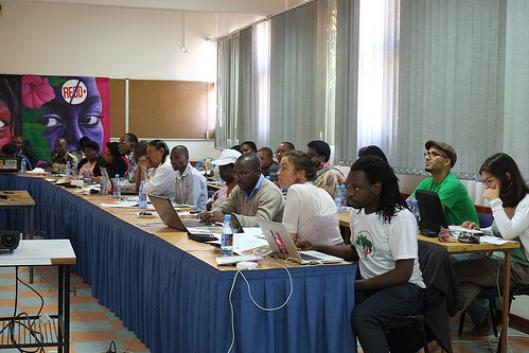The NO REDD in Africa Network gathered here in Maputo Mozambique, on 26 August 2013 during the occasion of an international workshop on REDD with participants from Mozambique, other African countries, North America and South America deliberated on the implications of Reducing Emissions from Deforestation and forest Degradation (REDD) for Africa and by extension the global South.
We recognise the decision of the Tunisia meeting in March 2013 that decided on the need for a No REDD Platform to educate and inform communities and governments of the developing countries about the negative impacts of REDD in all its forms.
We acknowledge the fact that African governments have been ambushed with offers and promises of development financing flowing through REDD and adopted this without applying critical minds and making the necessary consultations.
We appreciate the participation of government officials and representatives of government workers from various departments to contribute to the conversation on REDD but note the unfortunate position expressed by them that despite the repertoire of evidence against REDD, the African governments are adamant to go ahead with REDD.
We, the undersigned, noted and expressed the following;
1. REDD was basically designed as an escape hatch for polluters in the industrialised countries to enable them to continue to pollute while assuming that their pollution was offset in forests
2. REDD does not reduce emissions and is merely a project for carbon trading,
3. REDD does not halt deforestation but defers, displaces or actually encourages conversion of forests into monoculture tree plantations,
4. REDD and REDD type projects lead to displacement of forest dependent communities, servitude, killings, repression and other human rights abuses,
5. Much of African land and forests have been targeted for REDD and carbon credit projects or are marked to be auctioned off to private interests,
6. REDD rewards logging companies and agri-business,
7. REDD projects have been rushed on developing country governments with very little opportunity for internal and local consultation with the promise of development funding,
8. REDD represents a major threat to security of land, food and water in Africa as it is a land grabbing agenda of continental scale.
On the basis of the above and other considerations, the workshop declared as follows
1. Governments must take steps to protect our forests from deforestation and degradation and do so without expectations of carbon credits,
2. Polluting industries and countries must stop emissions at source and not deflect the burden
3. Demand and over-consumption are major causes of deforestation and must be reduced to sustainable levels,
4. Governments must improve weak and ineffective forest sector governance and ensure that forest-dependent communities are duly consulted and their consent obtained with regard to actions on their forests and forest resources,
5. Governments must facilitate and support a new development pathway not premised on forest conversion,
6. Governments must consider development alternatives that are based on the historical capacities of the local communities and only collaborate with investors on projects designed by them rather than accept development projects designed elsewhere primarily to meet the interests of others,
7. African governments have a duty to protect the resources of their nations and protect the people and resources in their care from recolonisation.
List of signatories:
Mozambique
1. Justiça Ambiental / Friends of the Earth Mozambique
2. AAAJC (Associação de Assistência e Apoio Juridico ás Comunidades Rurais/ Association for Support and Legal Assistance for Communities), Tete, Mozambique
3. Calisto André Nais – local farmer from Mabu, Zambézia province, Mozambique
4. Adolfo Muressama – local farmer from Mabu, Zambézia province, Mozambique
5. Manito Coutinho – ACODEMUZO and local farmer, Quelimane, Zambézia province,
6. União Provincial de Camponeses (UPC, Provincial Farmers Union) of Niassa province,
7. UPC of Cabo Delgado province, Mozambique
8. UPC of Nampula province, Mozambique
9. UPC of Tete province, Mozambique
10. UPC of Zambezia province, Mozambique
11. UPC of Sofala province, Mozambique
12. UPC of Gaza province, Mozambique
13. UPC of Maputo province, Mozambique
14. Engenharia sem Fronteira (Engineers without Borders), Maputo
15. Kutsemba, Matutuine, Maputo province, Mozambique
16. FONGA (Forum das ONGs de Gaza / Forum of NGOs of Gaza), Gaza province,
17. FBO-Plataforma Inter-Relgiosa para Governação Participativa
18. Boaventura Monjane
19. Renaldo C. João
20. Mateus Costa Santos
21. Mussa Chaleque
Regional & International
23. Friends of the Earth International
24. Friends of the Earth Africa
25. Environmental Rights Action / Friends of the Earth Nigeria
26. La Via Campesina Africa
27. La Via Campesina, Brazil
28. Rose Luxemburg Foundation, South Africa
29. Health of Mother Earth Foundation, Nigeria
30. Indigenous Environmental Network, USA
31. Movimento de la Juventude Kuna (Movement of Youth of Kuna), Panama
32. Earthlife Africa, South Africa
33. Timberwatch, South Africa
34. Rainforest Resource and Development Centre (RRDC), Nigeria
35. The Rules, Kenya / South Africa
36. World Rainforest Movement
37. Movimento Sem Terra (MST / Landless Peoples Movement), Brazil
38. Centre for Civil Society, South Africa
39. Forum of African Investigative Reporters, South Africa
40. African Biodiversity Network (ABN), Nairobi
41. International Political Forum
42. Juddy Blessol Wambui, Kenya
43. Cassandra Smithies, Researcher, USA

